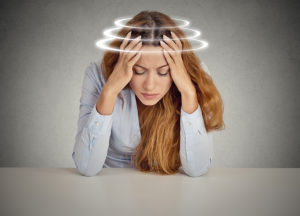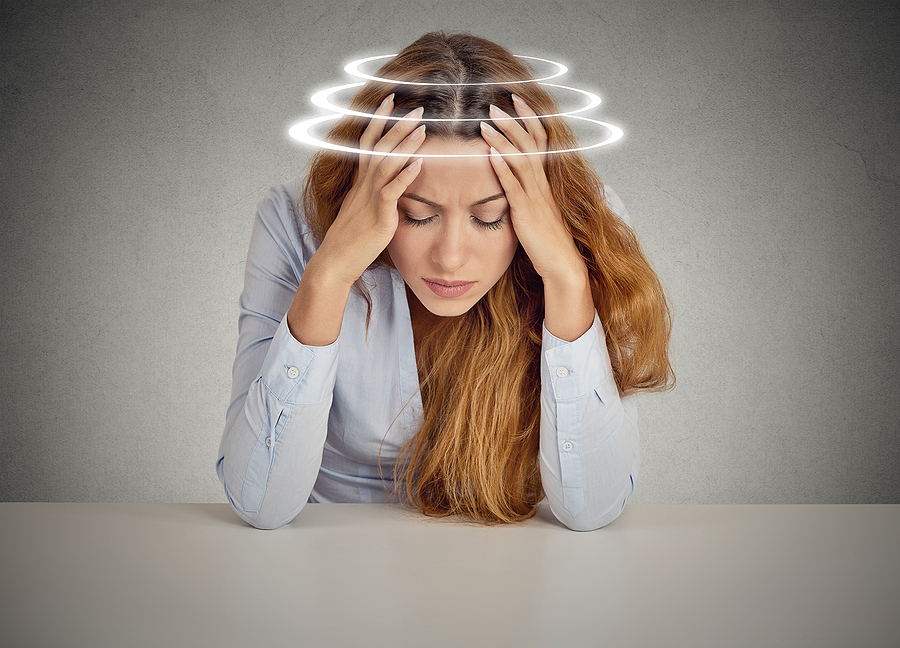
- Vertigo: a false feeling of motion as if you or your environment spins around
- Tinnitus: a ringing or buzzing noise in the affected ear
- A congested feeling of fullness in the affected ear
- Irregular hearing loss
- Nausea and vomiting
- Headaches
- Sweating
To become diagnosed with Meniere’s disease, you must have at least two or three of the first four symptoms on this list. A vertigo chiropractor in White Plains can help you find soothing comfort with many of these symptoms, significantly reducing the intensity and frequency of your vertigo attacks.
To learn more about the connection between head and neck injuries and migraines and other headaches, download our complimentary e-book by clicking the image below.

Meniere’s Disease Diagnosis
If you are dealing with vertigo, tinnitus, and hearing loss, go and visit your doctor. Then, the doctor may order any of these tests:
Hearing Test
This test determines if a patient suffers with hearing loss. It is also known as an audiometry test. Then, you will be tested using headphones and become exposed to various noises in various tones and volumes. You can report whether you can hear specific sounds or tones. It can help verify not just hearing loss but also which ones you can still hear clearly. Again, you will listen to particular words and repeat them. Both of your ears’ functions will get tested too.
- Auditory Brain Response (ABR)
- This test will check the nerves that help with hearing and the hearing centers located in the brain.
- An Electrocochleography
- It can measure electrical activity in the inner ear. It would determine whether your hearing loss comes from the inner ear or an issue in the ear’s nerve.
Balance Test
It checks the inner ear’s function, as people with Meniere’s disease will have a minimized balance response in just one ear.
- Posturography Testing
The test will let you put on a safety harness and stand barefoot on a platform. It will determine which areas of your balance system are not functioning correctly. Then, you will test how well you react to specific balance adjustments.
- Vestibular Evoked Myogenic Potential (VEMP)
This test will determine the sound sensitivity of the vestibule of your inner ear.
- Electronystagmography (ENG)
It is the most common test for balance issues. It would involve using electrodes around the eyes to detect eye movement. Abnormal eye movements are the usual response caused by the inner ear to indicate balance issues. This test involves hot and cold water introduced gently into your ear. The water would initiate the balance function of the ears. Finally, the involuntary movements of your eyes will be measured and tracked. Therefore, if abnormalities appear, then it would indicate the presence of an inner ear problem.
- Rotary Chair Testing
This test is less used. It will help indicate if your problem comes from the brain or your inner ear. Rotary chair testing works in combination with ENG. The ENG results may become distorted if the ear suffers from damage or ear wax blocks one of your ear canals. The chair moves in different ways. Then the eye movements will be recorded.
Other Tests
The doctor will most likely order a few other tests to rule out other conditions. Other illnesses have similar symptoms as Meniere’s disease. These would include brain tumors or multiple sclerosis. Thus, MRI’s or CT scans will check for potential issues in the brain. A vertigo chiropractor in White Plains can also check your spine’s health and alignment through upper cervical chiropractic care.
What Helps with Meniere’s Disease?
Care options for Meniere’s disease include traditional methods. Primary doctors recommend prescription medicine or possible surgery (as a last resort if nothing else works for you). The medication would deal with specific symptoms. Motion sickness medicine can help ease the patient’s vertigo, nausea, and vomiting. Also, anti-nausea or antiemetic drugs may help. Diuretics can decrease the fluid levels that the body contains. In other cases, doctors will give an injection that can deaden the nerves within the inner ear.
Vestibular rehabilitation exercises can also help reduce vertigo attacks. A physical therapist teaches it. Also, hearing aids can deal with hearing loss problems. Surgery is only required when the Meniere’s disease is too severe, and no other options work. This procedure is focused on the endolymphatic sac to minimize the amount of fluid it produces. This procedure is irreversible and permanent. Another surgery option would include a vestibular nerve section procedure. It cuts off the nerve that links the ear to your brain. Its effect would help reduce vertigo attacks while preserving your ability to hear. Finally, labyrinthectomy is possible to remove your inner ear.
A Successful, Natural Care for Meniere’s Disease
There was a clinical study conducted on 139 patients diagnosed with Meniere’s disease. These patients rated their vertigo episodes using a scale of 0 to 10 (with ten as the worst). They came up with an 8.5 on average. All the patients underwent upper cervical chiropractic care for two years. After two years, the patients reported an average of 1.4!
The study revealed that upper cervical chiropractors could take care of people with Meniere’s disease symptoms. How did this happen? The study revealed another discovery. All 139 patients sustained a misalignment in their bones or vertebrae of the upper cervical spine. Their misalignments were due to previous trauma or injury from the following:
- Vehicular accidents
- Sporting injuries
- Head and neck injuries or concussions
- Slipping, sliding, tripping, and falling incidents
Here at Upper Cervical Chiropractic of New York in White Plains, NY, our upper cervical chiropractor applies the same techniques used in the study. Dr. George Gertner’s approach is precise and gentle. His spinal adjustments lead to longer-lasting results. Numerous patients experience significant positive effects related to their vertigo after receiving our chiropractic care. So, call us at (914) 686-6200 or contact us to schedule an appointment with Dr. Gertner. Let a trusted vertigo chiropractor in White Plains help you today!
To schedule a consultation with Dr. Gertner, call (914) 686-6200 or just click the button below

If you are outside of the local area, you can find an Upper Cervical Doctor near you at www.uppercervicalawareness.com.


